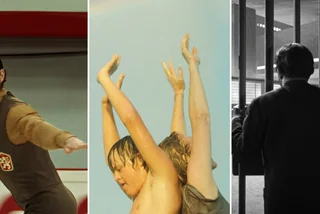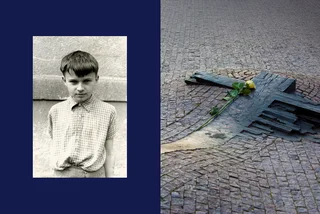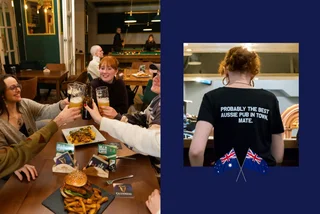The Velvet Revolution is unquestionably one of the most significant moments in Czech history. Twenty-five years on, we asked a group of Czech millenials – the first generation to grow up since the fall of Communism and therefore with no direct experience of life under socialism – one key question: “What does it mean to you to be Czech?” We received a broad range of answers but all agree on one thing: deciding what it means to be Czech in a globalised world is no easy task…
David Koranda, 3rd year MA Anglophone Studies, Charles University
PARTNER ARTICLE
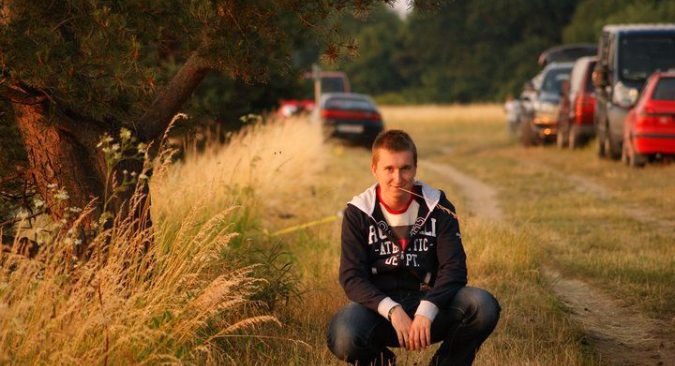
“To me, being Czech means that I get to lead a fairly good life but fortunately I am still able to grumble about fairly insignificant things. It means that when I complain about these things there’s luckily always someone who’s got it worse. It means that in my life I get to bemoan the astonishing number of idiots I have to put up with, and at the same time refuse to acknowledge that a lot of people must inevitably feel the same about me. It means that while I’m aware of how beautiful some parts of our country are, when it comes to vacations I’d rather go abroad.
It means that I get to criticise other nation’s sins and offences and then completely disregard our own; that I get to brag about how wonderful and complex the Czech language is, and then complain when I go see a movie and it’s dubbed; that I get to look crossly at tourists who come in the National Theatre dressed in T-shirts and jeans even though I’m far from a diehard patriot and the idea of wearing comfortable clothes actually appeals to me.
It means that I was raised an atheist, that I like beer, that I still hear the word ‘communist’ at least once a day, that I like to berate politicians I never voted for, that I also like to berate politicians I did vote for, that I’m actually not big on voting, that I have firm opinions on matters I know nothing about, that I’m set in my ways and don’t like change.
Yes, I’m Czech and I wouldn’t change a thing.”
Veronika Pojarová, aged 24, 4th year BA, English Language, Charles University
“Every morning, when I see the sun rising over Prague’s many rooftops and steeples, its first rays glinting on the Vltava, I am filled with exquisite joy knowing that this is my city! Prague, the most beautiful city I know, with its delightful little streets and majestic temples, with its remarkable history–every cobblestone has a story to tell! In the streets you can sometimes hear the mellifluous stream of voices – Czech voices – speaking that lovely, lyrical language of ours; the one that sounds like singing and, so I hear, is exceptionally difficult to learn. It’s the Czech language that, just like our nation, has stood the test of time, despite the fact that the odds were so often against it. We have only the perseverance of our ancestors and the unspeakable love they had for their homeland to thank for preserving Czech and with it our mesmerizing culture. Our language defines us on the most fundamental level, because without language there would be no national identity, and the Czechs might as well be Germans.”
Jaromír Lelek, 2nd year BA Anglophone Studies, Charles University
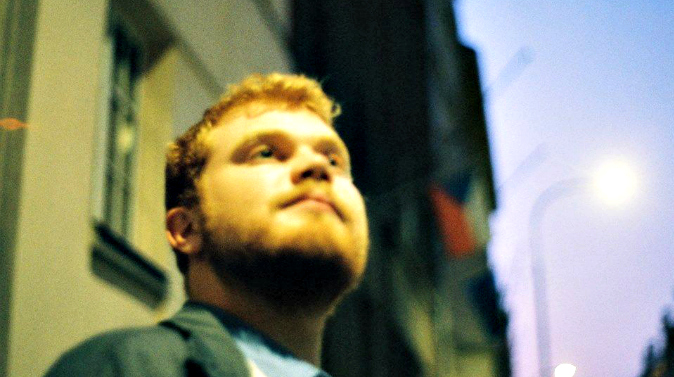
“How do I feel about being Czech? The first trait is a longing outside of ourselves, either West or East – the residual Cold War dichotomy – though I do have friends who are completely content to remain provincial. Connected to that, Czech people keep to themselves; they leave you be when you walk the streets. If you manage to get friendly, the amity is true.
Besides the Holy Trinity of beer, wine and weed, the grumpy faces during the morning commute and the mafia-ruled politics (spurring outliers to come and organise harking back to Czech dissent and Václav Benda’s notion of a ‘paralel polis’), I feel particularly Czech when clubbing to drum and bass, a music genre which reached the mainstream only in a handful of countries, including England.
Upon travelling abroad (something your parents let you know used to be impossible, over and over), a Czech person is reminded how small his country is. The foreign folk consider you either Czechoslovakian or Russian. And to add insult to injury, the French stole Kundera.”
Tomáš Balvín, 2nd year BA Anglophone Studies, Charles University
“Rumour has it that when journalists in Ukraine during the ongoing conflict wanted to avoid persecution, they claimed to be Czech – that way nobody would take them seriously. Twenty five years after the Velvet Revolution which seemed to promise so much, Czechs still want desperately to amount to something, to make up for the ‘stolen’ time. A quarter of a century later, they have failed to do so, and are laughed at in the attempt. Therefore, what being Czech means to me above all is witnessing the reckless, pathetic efforts to rank among the ‘western elite’ while very often forgetting and condemning what there was before. On a positive note, I’m sure that once nearly Czech identity barely exists at all, tourists from all around the world will still exclaim in elation “Czech Republic? Ah, Prague! Cheap beer!” and we, the addressees, will laugh about it – bitterly.”
Mišha Zaloudková, aged 22, 3rd year BA, Anglophone Studies, Charles University

“Living abroad and traveling have made me more aware of how Czechs are gradually managing to satisfy the needs of the new generation. We are now growing up in a country completely different from the one of our parents and it’s a big weight upon our shoulders: now that we have this power, what Czech Republic do we want for our future children? More smiles, less anger and bitterness and jealousy, more gender equality, the ability to be flexible, worldly, and multicultural? To me, being Czech now is a balancing act: Choosing a Caesar salad instead of the traditional and fatty knedlo, vepřo, zelo but keeping the beer.”
Martin Zýka aged 23, 3rd semester BA Politics and Society, School of Humanities and Social Sciences, Anglo American University
“Being Czech is an unchangeable inherited “condition”, a cultural background which probably stays with me no matter what person I am now or I’ll be in 20 years. It means that I am a part of this imagined community, and although it sometimes feels that Czechs aspire to be the most xenophobic nation in the world, it is also a nation which was self-reflective enough to vote for a fictional underdog – Jara Cimrman – to be the greatest Czech. The best illustration of how strongly I feel connected to the Czech nation is my reaction when I discovered that “Vltava”, really the quintessential piece of Czech classical music, is in fact just a revised Italian composition called “La Mantovana”, and not something purely Czech: I felt betrayed . So that is what it means for me to be Czech: an imagined community of fellow Czechs, with a common consciousness and common cultural background.”
Anna Marie Hupcejova, 2nd year BA Anglophone Studies, Charles University
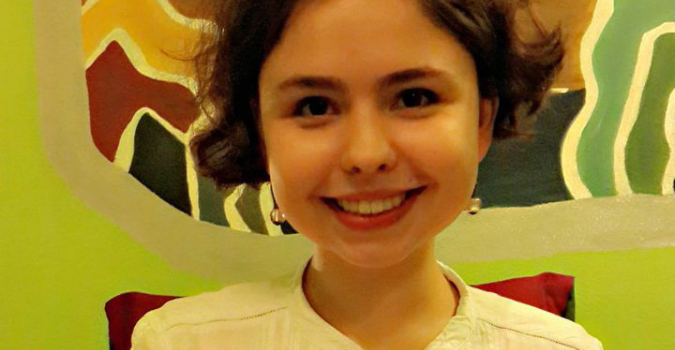
“My family is a true central European mix: Hungarian, Slovak, Austrian and Ruthenian. Thanks to my father’s job as a diplomat I grew up in Asia and before we moved to Prague, I only spoke English and basic Korean and viewed Prague as some place we return to every summer to see my brother. Whenever I was asked about my nationality, I replied “I’m from the Czech Republic” without knowing really what it meant. I did not grow up on Czech food (dumplings, beef broth soups with noodles etc), I did not know any of its history; I knew it was in the heart of Europe and when I enrolled at a Czech elementary school, I barely spoke a word of Czech and that made my studies difficult, but the other kids enjoyed my being lost in translation. Some of them to this day think that I’m Korean, which is silly really, given that I’m Caucasian.
For a long time, being Czech was just a word, a response to “what nationality are you?” Today the situation is different; I study at a Czech university in Prague, I speak Czech fluently (though with a slight English accent and many grammatical mistakes especially in my writing), I have Czech friends and most of all, I have gained a sense of identity, a sense of belonging, something that I missed out on all through my childhood. Hence being Czech for me is equal to having a land to live in and return to, where the mentality and behaviour of the people are close or at least similar to my own.”
Veronika Soukupová aged 22, double subject student in Czech language and literature and English linguistics (MA, first year)
“Being Czech means to me living in a country I love, yet, whose people and governmental regulations disappoint me. Whenever I see someone destroying what we have and what might not be here in the future (e.g nature).Whenever I see that some people are too intolerant and impolite towards each other I wonder whether it because of their jealousy? Or whenever I see that those who are ashamed of being Czech still celebrate when our football or hockey players win; and when that is the only time when they think it is the only thing our country can be proud of I also feel disappointed. There are more important things. It is just that our value system is not supported by those achievements that actually matter.”
Klara Cisarovska, recent graduate, Czech Technical University (CVUT)
“It means to me that I live in the centre of Europe. To be Czech is to exist at a geographical crossroads with all its benefits and negatives. You can have the best from the West or the East, but sometimes some power hungry nations decide that they will overrun us…”
Barbora Cejpová, aged 20, Anglophone Studies (2nd year), Norwegian Studies (1st year), Piano/Prague Conservatory (3rd year)
“Being Czech is a complicated and multi-layered business. On the one hand, it is quite pleasant to be a citizen of a small country as it is relatively unimportant and not every decision of the government is judged by the whole world. On the other hand, given our history of occupations and the current conflict in Ukraine, it is a little scary to think exactly how unimportant we may be (as in Neville Chamberlain and others’ attitude which might be summed up as “sure, give Hitler a part of Czechoslovakia, it’s just a piece of land, whatever”). Also, although the Czech Republic might be a small country, its leaders often seem to suffer from the Napoleon syndrome and try to look more important and educated than they are and end up looking straight up ridiculous – and that is usually what the foreign media notices.
Being Czech means that I don’t necessarily think Czechoslovakia or the Austro-Hungarian Monarchy were bad establishments but I understand the reasons that smaller countries decide to split from the bigger ones as I also support Scottish (if they ever decide differently), Catalan and Kurdish independence: I believe the right of a nation of sovereignty and self-determination is crucial because it has been taken from my country multiple times.
We are generally not as open and friendly as say Italians, which is mirrored negatively in the area of services. When I order an almond-flavoured soy latte, I expect the barista to make it without scowling since it’s on their menu. I’m no bragging privileged ignoramus who doesn’t understand the hardships of people working in the service industry. I work as a barista, too, and I would never allow myself to behave to the customers the way one is treated here in grocery shops, cafés and restaurants.”
Andrew J. Buring, 2nd year BA Anglophone Studies, Charles University
“I’m both Czech and American. However, in the eyes of other Czechs this means that I am responsible for everything the United States does, regardless of the fact that I was born here and have lived all my life in European countries. Most people, even those in this brave new generation of post-communist babies, continue to possess a xenophobia that seems to have burrowed deep into their genomes, resulting in a mistrust of foreigners and, at times, a bloated self-importance. Some Czechs are still fighting the Velvet Revolution. And they are losing. The rest have given up a long time ago. This is what it means to be Czech.”
Robert B. Johnson, 4th year BA, Business Economics, Faculty of Economics and Administration, Masaryk University

“Even though I have dual citizenship (Czech and US) and was born in West Germany, I strongly feel that I am Czech. This nation was dragged through most of the twentieth century, not as a sovereign state, but as a country dependent on the whims of other larger, more powerful nations. This has had a significant effect on the formation of the Czech people. We became a country frustrated from the past, suspicious about the present and pessimistic regarding the future: attributes visible even today.
Fortunately things started changing after the Velvet Revolution, when we regained our freedom. People had to stand on their own two feet, decide their own fate, which was new and not easy, but most enjoyed it and prospered.
I feel that my generation is one of the first in many decades that is truly not afraid. We travel, explore, broaden our horizons; we are the ones who will shape this country for decades to come. Being Czech in the remainder of the twenty first century will hopefully become synonymous again with the innovation, hard work and courage that it used to signify in times gone by.”
Josefina Formanová, 2nd year BA in Anglophone Studies and Philosophy, Charles University
I would rather go directly to Prague Castle and shout out all the words which represent what is being harmed by our current president: “democracy”, “honour”, “loyalty”, “politeness”, “respect”, “tradition”, “empathy”, “dignity” and many others. It is not meant to be implied, however, that my “Being Czech” is defined only through the disrespectful personality of our current head of the state.
I’ve been studying at University College Dublin for almost two months now and I realised after a very interesting debate with local lecturers, that one of the treasures of the Czech nation is our language. We preserved our own language for centuries, though occupied by Germans, Russians and others. There is also the great barrier of language that cannot be overcome by any other nation. It is not a boundary of any kind of territory – we all know this is a term that does not even have any kind of referent when looking back to the Ukrainian crisis which has unfold during the past six months. More ridiculously, once I traveled to Austria, a country that our nation was part of being a more or less respected part of the great Habsburg monarchy. It was the moment when the police stopped me and asked me to see my passport that I understood. There is no space for trust yet.
Trust is something that will lead my country to democracy. A vital trust that there are people who were capable of being more than people, i.e. who were able to fight for those words mentioned above, and not sink in a political river Lethe. These forgotten words, “freedom”, “dignity” and “democracy” were our legacy of the Revolution in 1989.
As a Czech person, despite everything I will reply to the question with a hopeful imperative: “May the words such as “shame” and “doubt” be forgotten; may the words “freedom”, “dignity”, “democracy” and “loyalty” be rediscovered.”
**
25 years on, how has the Czech Republic changed?












 Reading time: 12 minutes
Reading time: 12 minutes 
















